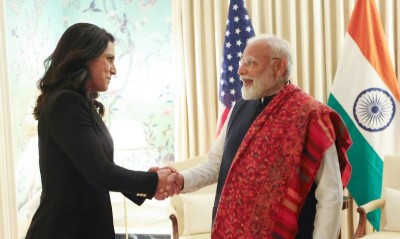 Narendra Modi
Narendra Modi
India contributes less than 4 percent to global carbon emission, says Narendra Modi at Cop 28 Summit in Dubai
Prime Minister Narendra Modi on Friday said India's contribution to global carbon emissions is less than 4 percent despite being the most populous country in the world.
Speaking at the COP28 Summit in Dubai, Modi said: "Despite being home to the World's 17% population, India's contribution to Global Carbon emissions is less than 4%."
"India has set an excellent example of balancing the ecology and the economy," he said.
He said: "India has decided to move towards 'Net Zero emissions' by 2070."
Modi said: "For alternate fuels, India has promoted the use of Hydrogen as fuel and launched the Global Biofuels Alliance."
He said India emphasised extensively on sustainable development during the G20 Presidency.
Prime Minister Narendra Modi arrived in Dubai late Thursday to attend COP 28 or the World Climate Action Summit, where he is making his presence for the third time.
The 28th edition of COP will run till December 12.
What is a ‘COP’?
UN climate conferences are government-level large-scale annual gatherings focused on climate action. They are also referred to as COPs – Conference of the Parties to the UN Framework Convention on Climate Change (UNFCCC).
The UNFCCC convention entered into force on 21 March 1994 to prevent “dangerous” human interference with the climate system.
Today, ratified by 198 countries, it has near-universal membership. The Paris Agreement, adopted in 2015, works as an extension of that convention.
Over 60,000 people are expected to attend COP28, including delegates from member states of the UNFCCC, industry leaders, youth activists, representatives of indigenous communities, journalists, and other stakeholders.
It is a critical moment for global climate action.
COP28 will provide us with a reality check – a culmination of a process called ”Global Stocktake” – on how far the world has come in tackling the climate crisis and how much of a course correction is needed.
Why is the COP28 conference important?
Since the adoption of the Paris Agreement on climate change at COP21 in 2015, subsequent conferences have revolved around implementing its key goal: halt global average temperature rise to well below 2°C and pursue efforts to limit the rise to 1.5°C above pre-industrial levels.
If Paris gave us the agreement, Katowice (COP24) and Glasgow (COP26) showed us the plan. Sharm el-Sheikh (COP27) then shifted us to implementation.
Now, COP28 is expected to be a turning point, where countries not only agree ‘WHAT’ stronger climate actions will be taken, but show ‘HOW’ to deliver them.
Measuring the progress towards achieving the Paris goals on mitigation, adaptation and climate finance and adapting existing plans is a key part of the puzzle, and this is why COP28 assumes more significance.
The first global stocktake, which began at COP26 in Glasgow, will conclude in Dubai.
The process is designed to help identify what more still needs to be done and guide countries towards more ambitious and accelerated climate action plans.
So, the decision adopted by the parties at COP28 could emerge as the most consequential outcome following the 2015 Paris conference.
Support Our Journalism
We cannot do without you.. your contribution supports unbiased journalism
IBNS is not driven by any ism- not wokeism, not racism, not skewed secularism, not hyper right-wing or left liberal ideals, nor by any hardline religious beliefs or hyper nationalism. We want to serve you good old objective news, as they are. We do not judge or preach. We let people decide for themselves. We only try to present factual and well-sourced news.








